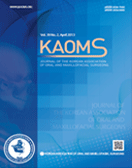Journal of the Korean Association of Oral and Maxillofacial Surgeons
- P-ISSN2234-7550
- E-ISSN2234-5930
- SCOPUS, KCI, ESCI
 ISSN : 2234-7550
ISSN : 2234-7550
Reasonable necessity of preoperative laboratory tests in office-based oral and maxillofacial surgery
Mi Young Eo (Department of Oral and Maxillofacial Surgery, Dental Research Institute, School of Dentistry, Seoul National University, Seoul, Korea)
Kezia Rachellea Mustakim (Department of Oral and Maxillofacial Surgery, Dental Research Institute, School of Dentistry, Seoul National University, Seoul, Korea)
Buyanbileg Sodnom-Ish (Department of Oral and Maxillofacial Surgery, Dental Research Institute, School of Dentistry, Seoul National University, Seoul, Korea)
Hoon Myoung (Department of Oral and Maxillofacial Surgery, Dental Research Institute, School of Dentistry, Seoul National University, Seoul, Korea)
Soung Min Kim (Department of Oral and Maxillofacial Surgery, Dental Research Institute, School of Dentistry, Seoul National University, Seoul, Korea)
Abstract
Objectives: As medical history before surgery is often based on patient reporting, there is the possibility that patients intentionally hide underlying diseases or that dentists cannot recognize abnormal health states. Therefore, more professional and reliable treatment processes are needed under the Korean dental specialist system. The purpose of this study was to elucidate the necessity of a preoperative blood testing routine prior to office-based surgery under local anesthesia. Patients and Methods: Preoperative blood lab data for 5,022 patients from January 2018 to December 2019 were assembled. Study participants were those who underwent extraction or implant surgery under local anesthesia at Seoul National University Dental Hospital. Preoperative blood tests included complete blood count (CBC), blood chemistry, serum electrolyte, serology, and blood coagulation data. Values outside of the normal range were considered an “abnormality,” and the percentage of abnormalities among the total number of patients was calculated. Patients were divided into two groups based on the presence of underlying disease. The rates of abnormalities in the blood tests were compared between groups. Chi-square tests were performed to compare data from the two groups, and P<0.05 was considered statistically significant. Results: The percentages of males and females in the study were 48.0% and 52.0%, respectively. Of all patients, 17.0% (Group B) reported known systemic disease, while 83.0% (Group A) reported no specific medical history. There were significant differences between Groups A and B in CBC, coagulation panel, electrolytes, and chemistry panel (P<0.05). In Group A, the results of blood tests that required a change in procedure were identified even though the proportion was very small. Conclusion: Preoperative blood tests for office-based surgery can detect underlying medical conditions that are difficult to identify from patient history alone and can prevent unexpected sequelae. In addition, such tests can result in a more professional treatment process and build patient confidence in the dentist.
- keywords
- Preoperative laboratory test, Office-based, Oral and maxillofacial surgery
- 37Downloaded
- 156Viewed
- 0KCI Citations
- 0WOS Citations